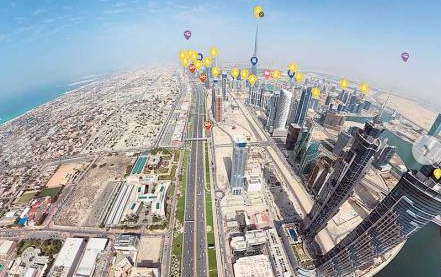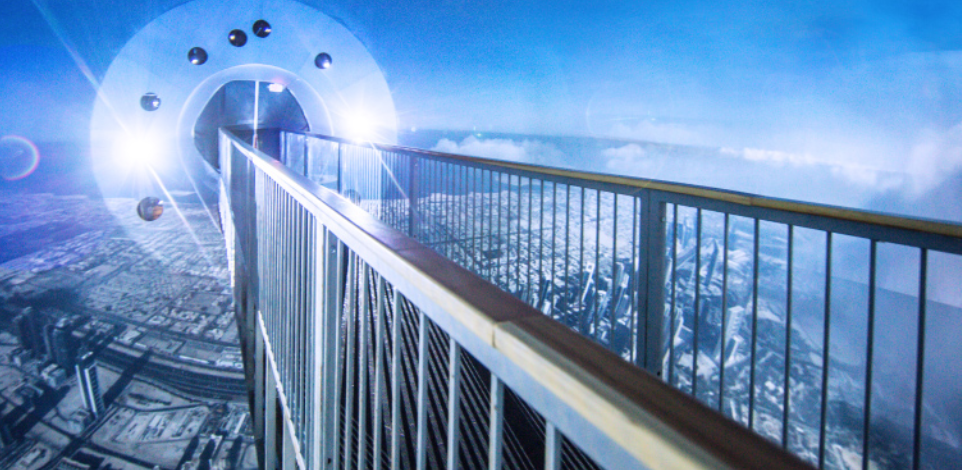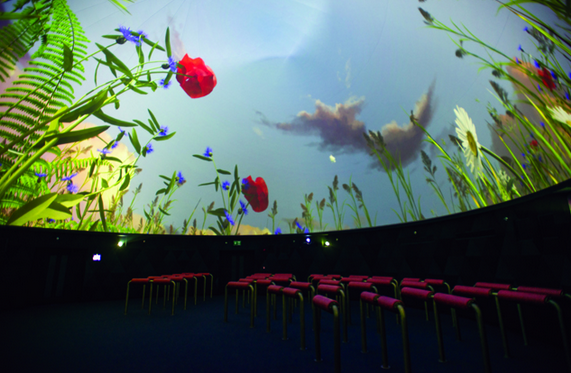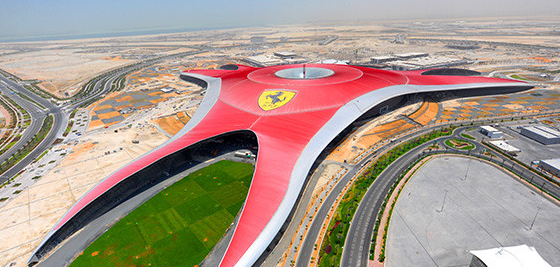The field of the visual art is actively developing, and today researchers speak about the era of the multimedia design in the modern art. According to Packer and Jordan, multimedia “is emerging as the defining medium of the twenty-first century”, and much attention should be paid to the discussion of multimedia as the integration of a variety of artistic forms and techniques to attract the audience (Packer & Jordan, 2002, p. xv).
The focus on the multimedia is observed in any social field, and this combination of artistic tools and forms is used in the educational sphere, entertainment, and business. The development of information technologies allowed combining different media almost without barriers. This process is also observed in the United Arab Emirates (UAE), where the advantages of the multimedia design are used in developing new places of entertainment, cinemas, organizing festivals and art exhibitions. In spite of the fact that the other Gulf Cooperation Council (GCC) countries also utilize the benefits of the multimedia design, the UAE is among the world innovators in the sphere, and this area is rapidly developing in the country with the focus on the progress of such tendencies as 4-D effects, 360-degree cinemas, and the full immersion.
Multimedia Design and Its Definition
The multimedia design is discussed by theorists and practitioners as the art field, the main feature of which is the combination of different media in order to produce a certain effect on the audience (Abbasi & Baroudi, 2012). From this point, the multimedia design is oriented to appeal to almost all senses of the viewer and to make him or her become the part of the art object through the concept of interactivity. Thus, the main features of the multimedia design as the use of combined tools to achieve a certain effect are interactivity, immersion, integration, hypermedia, and narrativity. Interactivity means the involvement of a viewer or user in the process of developing the art object through manipulating it. Such traditional products of the multimedia design as websites and simulations allow users the active participation in the process of the object transformation (Luque, Galloso, Feijoo, Martín, & Cisneros, 2014, p. 16).
The idea of immersion is closely associated with interactivity because the multimedia design usually allows a user to become the part of the three-dimensional environment. These effects are typical for modern art exhibitions, installations, as well as 3-D and 4-D cinemas or IMAX cinemas. The immersion is possible when there is an integration of different artistic forms with the innovative technologies. Grau notes that the technology contributed to the development of the multimedia design, and it “was applied in the attempt to integrate the image and the observer: stereoscope, Cineorama, stereoptic television, Sensorama, Expanded Cinema, 3-D, Omnimax, and IMAX cinema” (Grau, 2004, p. 5). Hypermedia is related to the direct combination of multiple media elements with the purpose of their integration. Narrativity is associated with such feature of the multimedia design as the ability to apply different aesthetic approaches and tools.
When all these components of the multimedia design are used in one art or media object, viewers receive the opportunity to perceive images differently because interactive objects seem to remove barriers to the users’ perception and participation. Gibson claims that multimedia “is not an invention but an ongoing discovery of how the mind and the universes it imagines (or vice versa, depending) fit together and interact” (Gibson, 2002, p. xiv). In addition, discussing the multimedia strategy, Grau concludes that it “aims at producing a high-grade feeling of immersion, of presence (an impression suggestive of “being there”), which can be enhanced further through interaction with apparently “living” environments in “real time” (Grau, 2004, p. 7).
From this point, the multimedia design is a specific discipline that aims to enrich the experience of users and viewers while focusing on the idea of integrated images and artistic forms and on the concept of interactivity. Therefore, today the multimedia is actively used in many spheres of the social life.
The Use of the Multimedia Design in the UAE
Artists, designers, and professionals in graphic design working in the UAE are traditionally discussed as innovators in the area of the multimedia design. The most vivid multimedia objects are created and creating in Dubai and Abu Dhabi. The sphere of multimedia design in the UAE attracts many talents from all over the world because of significant investments in the development of the artistic and technological components of the multimedia projects (Khamis, 2015).
From this perspective, the governments of the Emirates contribute to the progress of the multimedia as the part of the business, social, and cultural programs. The professionals in the sphere of multimedia receive many opportunities and resources to realize their ideas with the focus on innovative technologies and strategies to integrating the media. As a result, such an approach has the significant positive effect on the development of Dubai and Abu Dhabi as cultural and entertainment centers in the region in comparison to other cities in the GCC countries.
The examples of the latest prominent achievements in the sphere of the multimedia design are numerous. The interactive tour in Dubai known as Dubai 360 is one of the most vivid examples of using the multimedia for working with websites (Khamis, 2015). The launch of the largest virtual and interactive city tour in the world demonstrated what opportunities are opened to the multimedia designers working on interactive websites in the UAE. The service illustrates how it is possible to integrate the panoramic photographs with the interactivity component to produce the unique experience for users (Figure 1).

The developers of Dubai 360 also created Obscura Spherical Projection Theater that is actively used in education and for entertaining the audience (Dubai 360, 2015; Figure 2). This theater demonstrates the extent to which multimedia designers can use the idea of immersion in their projects.

The multimedia designers are among the most experienced in the world to develop 360-degree cinemas. The Dome Box is one of the unique cinemas in the world that allows the spectators to enjoy the advantages of a 360-degree screen that is placed in the ceilings (Awesome 360-degree cinema, 2015; Figure 3). Still, the multimedia designers in Dubai went further and proposed the advantages of the 4D cinema in the chain of VOX Cinemas. As a result, Dubai currently uses the latest technologies in the sphere of the multimedia design, and the professionals working in the UAE are among pioneers in the industry. The audience in the Emirates has the opportunity to enjoy unique experiences while watching films or attending the theater. 360-degree and 4D cinemas provide the opportunity to involve almost all senses, and the perception of the spectator becomes full.

The most unusual experience is associated with visiting Ferrari World in Abu Dhabi, where people can perceive the art and images using all their senses (Ferrari, 2015; Figure 4). Therefore, it is possible to speak about the integration, immersion, interactivity, hypermedia, and narrativity not only as theoretical components but also as aspects describing the quality of the multimedia projects in the UAE.

However, the multimedia design in the UAE is a developing sphere, and innovators in the field need to exchange the experience with other professionals in the industry. Therefore, Dubai regularly hosts exhibitions and main events in the area of the multimedia design. ISEA 2014 was one of the most influential art and design symposiums located in Dubai. Another important event is Dubai Design District, the participants of which aim to share their accomplishments and exchange their experiences in the area of the multimedia design. These projects, conferences, exhibitions, and events have the significant effect on the development of the multimedia tradition in the UAE as the country where the most innovative and provocative ideas are realized with the support of the government.
Conclusion
The UAE is the leading country in the GCC region in terms of using the advantages of the multimedia design and technologies. The professionals working in the UAE are known as innovators in the area because they focus on realizing the most provocative ideas and integrating the recent technologies and numerous art forms. The multimedia design is rapidly developing in the UAE, and the most vivid examples of this process are the opened cinemas with 4-D effects, 360-degree cinemas, and theaters providing the full immersions. Many conferences and events in the sphere of the multimedia design are also held in Dubai as the center of the innovative thought. From this point, the multimedia design is the area in which professionals can realize their art ideas with the focus on multiple technologies and available tools.
References
Abbasi, A., & Baroudi, U. (2012). Immersive environment: An emerging future of telecommunications. IEEE MultiMedia, 1(1), 80-86. Web.
Awesome 360-degree cinema at Boxpark. (2015).
Dubai 360: Spherical Projection Theater. (2015). Web.
Ferrari: Ferrari World Abu Dhabi. (2015). Web.
Gibson, W. (2002). Foreword. In K. Jordan & R. Packer (Eds.), Multimedia: From Wagner to virtual reality (pp. xi-xiv). New York, NY: W. W. Norton & Company. Web
Grau, O. (2004). Virtual art: From illusion to immersion. New York, NY: The MIT Press. Web
Khamis, J. (2015). Dubai 360 launches the world’s first online interactive city tour. Web.
Luque, F. P., Galloso, I., Feijoo, C., Martín, C. A., & Cisneros, G. (2014). Integration of multisensorial stimuli and multimodal interaction in a hybrid 3DTV system. ACM Transactions on Multimedia Computing, Communications, and Applications, 11(1), 16-28. Web
Packer, R., & Jordan, K. (2002). Overture. In K. Jordan & R. Packer (Eds.), Multimedia: From Wagner to virtual reality (pp. xv-xxxviii). New York, NY: W. W. Norton & Company. Web